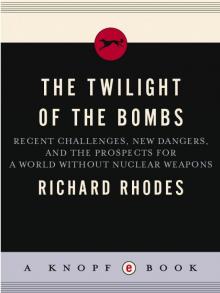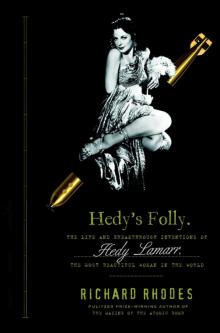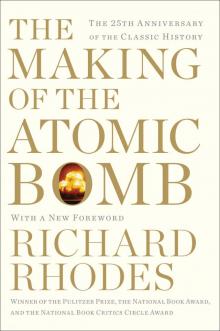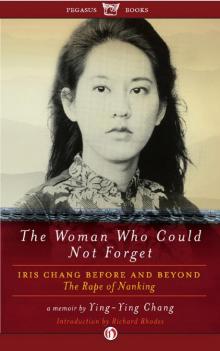- Home
- Richard Rhodes
Woman Who Could Not Forget Page 3
Woman Who Could Not Forget Read online
Page 3
The Institute’s housing department was very kind—after they heard that we had a newborn, they let us move to a bigger housing unit, which had two bedrooms. They also gave us a brand-new baby crib. Indeed, the Institute knew how to provide a loving and nurturing environment for intellectuals and scholars.
With no relatives around, Shau-Jin and I raised Iris completely by Dr. Spock’s famous book. Iris had a very small appetite. From the very beginning, she would only take a few ounces of formula at each feeding, and I always wondered whether she’d had enough. Being a scientist, I faithfully recorded her amount of intake at each feeding. At the end of each day, I would add up the total ounces of formula Iris had had. My friends laughed at me for being so systematic and analytical.
For many months after Iris was born, Shau-Jin was very happy and jubilant. When he got home from work, he would ask to hold her and feed her; he even changed her diaper. I did not realize how happy he was until one of his physicist colleagues told me that Shau-Jin had been continuously smiling at work since the time Iris was born.
The colleague said “I have not seen him close his mouth since then. Does he smile while he’s sleeping?”
Although we were very happy with this new addition to our lives, the outside world was in chaos. Not only was there war in Vietnam, but, just a week after Iris was born, Martin Luther King, Jr. was assassinated on April 4, 1968 in Memphis, Tennessee. The whole country plunged into shock. Violence broke out in major cities across the nation, from Los Angeles to New York. Holding Iris in my arms, I could not breathe as I watched the burning and looting on TV. My heart sank as I wondered what kind of world Iris would grow up in. When that week’s issue of Newsweek arrived, the magazine’s front cover was of King lying in his coffin, with an old lady crying over his body. I told Shau-Jin I would save this issue for Iris, so that when she grew up she would learn what had been happening in the world at the time of her birth.
Then on June 5, when Iris was only two months old, Robert Kennedy was assassinated in Los Angeles. Again, the whole country went into shock. It reminded me of the day John F. Kennedy had assassinated in Dallas in 1963. Shau-Jin and I had then been graduate students at Harvard. We had been in the U.S. only one year at that time, having just arrived from Taiwan. The whole country had been in mourning. Now, however, in addition to the sadness, I felt anger. As I embraced Iris close to my chest and fed her, I looked into her eyes and murmured to myself: how can I protect you from this senseless world?
I still have that issue of Newsweek from April 15, 1968, but the cover and the paper have turned yellow. Iris has been dead for six years at this writing, and the United States is trapped in another “Vietnam.”
I was quite uncertain at this time whether I should stay home as a full-time mom or return to work. On the one hand, I wished to stay home and take care of the baby, and believed, as my own mother told me, that no one was a better caretaker than the mother herself. On the other hand, I had just received my doctoral degree, and I really loved my work. Besides, from the very beginning, my dream was to become a scientist, and I wished to contribute what I had learned to society. After six months at home as a full-time mother, my continuous internal debating and struggling had made me miserable. Seeing me so unhappy, Shau-Jin encouraged me to go back to work. He said he believed that an unhappy mom at home would be worse than a happy working mom. I therefore landed a part-time postdoctoral research job in the lab of Professor Jacque Fresco in the Department of Chemistry at Princeton. I started working three days a week in the fall of 1968, when Iris was six months old.
In the 1960s, the majority of women stayed at home once they had children. There were not many childcare facilities or support groups for professional women, or working-mother models I could follow. I managed to work part-time for a year, but it was not without physical and mental challenges.
When I went to the lab to work after dropping Iris with her sitter, I could not stop thinking about what was happening to her. Had she stopped crying? What was the sitter doing with her if she continued to cry? These thoughts were excruciating. Sometimes, I could not concentrate on work, as I wondered whether I had made the right choice.
One way to solve the problem was to persuade my mother in Taiwan to come help. My mother was very willing and happy to do so. She spent about three months with us, but after three months my father back in Taiwan was unhappy and lonely. My mother returned home.
Yet I learned so much from my mother during those three months. First of all, my mother told me that Iris stopped crying once she saw me leave for work. She said “As soon as your car disappeared from the driveway, she turned to me, smiling with her tears still in her eyes.”
As a biologist, I’ve always been interested in child development and fascinated by the biochemical basis of brain function. Although Shau-Jin is a physicist, he too is very interested in many biological phenomena. We often discussed at the dinner table how to bring up Iris using the best available knowledge. For example, we had read an article in one of the child-behavior magazines indicating that it’s essential for normal brain development for children to go through the crawling stage. Before Iris could walk, we let her crawl all over our living room.
Shau-Jin was especially eager to expand Iris’s brain function. He bought two three-dimensional wooden puzzles, one a sphere and one a cube, and put them in front of her when she was only a few months old. Since Iris seemed to have no interest in them other than putting them in her mouth, Shau-Jin started to play with the toys himself. It took him, a physicist, several hours to figure out the puzzles, as well how to put them back to their original shape after taking them apart. After that, these puzzles went onto Shau-Jin’s office desk to test his graduate students’ IQ!
When Iris was born, Shau-Jin and I agreed that we should teach Iris both English and Chinese. There are several advantages to speaking two or more languages. We knew for learning languages, it was better to start in a child’s early years. It was natural for us teach her Chinese in addition to English, because Shau-Jin and I speak Chinese at home. At the beginning, we were not so sure about teaching two languages at the same time. Some of our Chinese friends told us that if we let our children learn both Chinese and English, they would get confused. They said that life in the U.S. for Chinese immigrants was hard, and they strongly urged us to teach the next generation only perfect English for survival. However, a visiting professor from Holland in the Bonner lab where I was working assured me otherwise. He told me that in Holland every child learned several languages when they were little without difficulty. He added that children who learned several languages were smarter than those who learned only one language. I therefore did a little research and found that indeed new language centers could be formed in the brain when children were introduced to multiple languages early on. With this knowledge at hand, we determined to teach Iris both languages. We would speak Chinese at home but English outside of the home.
In 1969, Shau-Jin was offered the position of assistant professor in the Department of Physics at the University of Illinois at Urbana-Champaign. So, in the summer of 1969, we ended our two-year stay in Princeton. But just before our move to Illinois, Shau-Jin was invited to a physics conference in Trieste, Italy. We were eager to take this opportunity to visit Europe.
We spent two weeks of June in Europe while Iris was only fifteen months old. My friends thought it would be too stressful to bring such a young toddler to foreign countries, but we managed. We brought with us dozens of disposable diapers and an infant back carrier, and we took turns carrying Iris on our back. We saw the Castle of Miramare in Trieste, the St. Marcus Square in Venice, the Vienna woods, and the River Danube. It was an unforgettable experience, walking through the magnificent Vienna parks that surround the summer palace, Schönbrunn. We were young and did not have any problems carrying a twenty-pound child. A photo shows the three of us sitting on top of a stone rail in a memorial overlooking the palace and the city of Vienna. Shau-Jin and I are holding
Iris on our lap. We are all smiling and looking into the future with the brightest hope that our daughter will be a Chinese Phoenix.*
_______________________________
* In the Chinese culture, people wish for their sons become a “Dragon” and their daughters a “Phoenix” (Feng Huang). The Chinese Phoenix is an ancient colorful bird of grace and high virtue. When paired with a dragon, a phoenix symbolizes the Empress, and a dragon represents the Emperor. These also are the symbols signifying the highest achievement one can reach.
Childhood
When Iris was less than a year and a half old, we made the move to the University of Illinois at Urbana-Champaign where Shau-Jin had accepted the teaching position. But he was also going to attend a physics workshop in Boulder, Colorado in August, before the start of the school year.
On August 2, 1969, we hopped into our first new car, a green Dodge Dart, and headed west. We bought the car from a dealer located on the border of New Jersey and Pennsylvania for $2,400. Because we did not have much money, we bought a basic car with no extras, such as automatic shift or air conditioning.
First, we drove to Urbana to visit the university campus and look for living quarters for the fall. We found a new duplex, of which we rented one part, and bought some second-hand furniture. After these arrangements were made, we continued our journey to Colorado. We drove through the contrasting landscapes of the cornfields of Iowa and Nebraska, to the beautiful Rockies of Colorado. Once in Boulder, Shau-Jin met all his physicist friends again, like a summer camp reunion. During the day, Shau-Jin was doing physics and I ran errands with Iris. In the evenings, Shau-Jin would have his friends come to our home for an informal gathering. On the weekends, we would often hike on the nearby trails with Iris in a carrier on our backs. We took turns carrying her. We explored many of the nearby state parks and, of course, Rocky Mountain National Park was the most impressive of all. I secretly wished that we could live in this beautiful part of the country for the rest of our lives.
After the workshop in Boulder was over, we began our drive back to Urbana. Iris, who was seventeen months old at the time, did not feel well. When we were about halfway home, she developed a high fever and, unfortunately, our new car’s lack of air conditioning didn’t help. It was the end of August, and the temperature in the car was unbearably hot. We decided to drive the rest of the way during the night while it was cool, and stay in an air-conditioned motel during the day. That evening, we stopped at a small town near Omaha. It was too late to see a doctor that evening, but we were able to consult one on the phone. Without seeing Iris, all he could say was to keep her temperature down, something we were already desperately trying to do.
I was so worried about Iris’s condition that I wanted to get back to Urbana as soon as possible. She was fussing and crying with the fever, and I was trying to soothe her as best I could, but all I could do was to watch over her helplessly. At that moment, I suddenly realized how my parents must have felt more than thirty years ago when my brothers, sisters, and myself were ill during those difficult war years in China when we were growing up. My thoughts flashed back to the 1930s and 1940s in China as Shau-Jin drove through Iowa on that dark, moonless night in August.
I was born in Chungking (now Chongqing), China in 1940. Chungking was the wartime capital of China during the eight-year-long War of Resistance against Japan, Kang Ri zhanzheng. Nineteen forty was a year of great suffering for the Chinese people. It was just one year before the Japanese bombed Pearl Harbor, which brought the United States into the war in Asia. China had been fighting Japan alone since 1931, when Japan had invaded Manchuria.
My parents escaped from Nanking in 1937 and retreated with a vast number of refugees, first to Wuhan on the Yangtze River, and then by train to Hengshan, a small town near one of the major north-south railroads. We stopped at Hengshan because my mother was in the last month of her pregnancy. She was carrying my elder brother, Cheng-Cheng, who was born in 1938, six days after the Chinese New Year.
In 1940, the Japanese Army had occupied a good portion of northern, eastern, and southern China, and now they started to bomb the southwestern provinces. Since it was the capital, Chungking was one of the prime targets. Japanese airplanes dropped bombs on Chunking day and night, hoping to bomb China into submission. According to my parents, the air raids went from once a day to twice a day. Once the air raid sirens sounded, everyone dropped whatever they were doing and ran into the bomb shelters. At the time, China did not have sufficient airpower to defend her skies. Groups of twenty to fifty Japanese bombers would frequently appear over Chungking’s skies and drop bombs at will. Thousands of civilians were killed, their homes, schools, and hospitals destroyed. In later years, my parents described to us the many horrors they witnessed after the bombings. There were always numerous fires. Whole blocks of houses were destroyed. My father saw charred bodies everywhere and smelled the stench of burning flesh. My mother saw a severely burned woman holding the charred body of her child whom she had tried to save, but she herself was burned in the process. There were many other scenes of horror that my parents could not forget, such as a hand hanging from a tree, or part of a leg dangling on an electrical wire, grotesque reminders of the bomb explosions.
A few weeks before I was due, my father registered my mother in Chungking Central Hospital, located by the Yangtze River. He thought that since the hospital looked sturdy and well built, my mother would be safe there. Several days later, the Japanese bombed the hospital, and a part of it was destroyed. Fortunately, my mother was moved into the hospital bomb shelter just in time.
To avoid the constant bombing, my father arranged to have our family moved to a village in the mountains where there were many natural caves that served as bomb shelters. In those times, living was extremely difficult. There was a severe shortage of supplies—medical supplies in particular—and daily necessities were now luxuries. The Japanese had bombed and cut off our supply routes. All available resources were used to support the war effort.
During that time, I was sick with amoebic dysentery due to eating contaminated food and drinking unsanitary water. My parents told me that I had a high fever and bloody diarrhea. Nowadays it’s easy to cure such illness with modern medicine, but at that time and in those conditions it could lead to death. My father desperately ran from drugstore to drugstore in Chungking trying to find the needed medicine. Miraculously, he found it in a small store on a small side street of Chungking, and I was saved.
On that dark moonless night, our car speeding through the lonely cornfields of Iowa, I touched Iris’s forehead and truly understood the love of parents for their child. It was a sacrifice, an unconditional love. I could now identify with these feelings and was fully touched.
After we arrived in Urbana, near Labor Day 1969, we moved into our rented duplex. The house was located in the west of Champaign. Urbana-Champaign is a twin city and Champaign is west of Urbana. (The major campus of the University of Illinois is in Urbana.)
Once we settled down, I started to look for a job. I had applied to the Department of Biochemistry. After two months of waiting, Professor Lowell Hager called me and said that he could hire me on a part-time basis, which, given my situation, was ideal. So I started working as a research associate in November, when Iris was nineteen months old.
I was actively looking for a baby-sitter, and, to my good luck, I was introduced to a student’s wife, Mrs. Hsu, who had a son about Iris’s age. In the morning, we brought Iris to Mrs. Hsu’s home, and at the end of the day we picked her up. Iris cried the first several times we dropped her off, but gradually she got used to the routine and played with Mrs. Hsu’s son very well. To me, this was a big relief. Mrs. Hsu was a nice lady and a good mother. She was very kind to Iris.
One day, I told her that I’d noticed that Iris liked to frown and did not smile as she had before. I asked her why.
She said, “Have you smiled yourself lately?”
That one question enlightened me. Indeed, Shau
-Jin and I had been troubled by a number of issues in our departments, and we were actually unhappy at the time. Mrs. Hsu encouraged me to relax and enjoy my life. From that day on, I often looked at myself in the mirror and practiced smiling. What a difference it made to my appearance when I smiled! What showed on my face was what Iris would see. She would imitate and use everything she saw as a model.
Shau-Jin and I were already thinking about having a second child. I found out that I was pregnant again in February 1970. Life was really busy. Shau-Jin was active in teaching and research and had published a number of papers. My time was equally busy in the laboratory doing my research, taking care of Iris, and doing household chores. Cooking and shopping consumed the majority of my time when I was not in the laboratory. I had no outside help—in fact, we could not afford to hire any outside help, because the amount I paid the sitter had already taken a big bite out of our salaries.
In March 1970, my mother in Taiwan became seriously ill, and in April I was sick too. The pregnancy, the research, and a small child to take care of made me physically and mentally exhausted. I was badly in need of rest, and I also needed to visit my mother in Taiwan. After six months on the job, I decided to quit. I was determined to be a devoted mother and to concentrate on raising Iris and on awaiting the arrival of our second child.

 The Twilight of the Bombs
The Twilight of the Bombs Hedy's Folly
Hedy's Folly Making of the Atomic Bomb
Making of the Atomic Bomb Woman Who Could Not Forget
Woman Who Could Not Forget